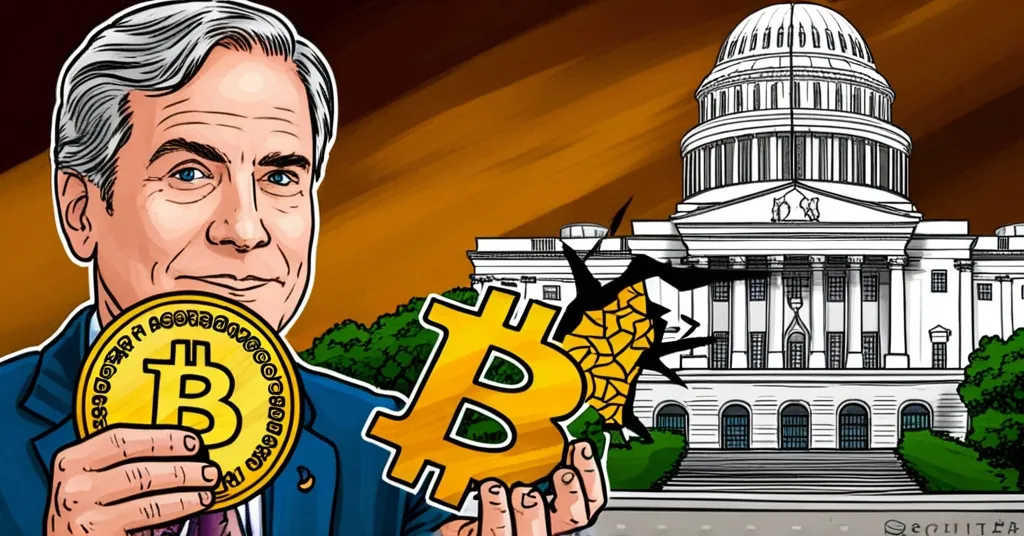Peter Schiff’s USA Coin Proposal: A Centralized Twist on Digital Currency

Peter Schiff’s FOMO: The USA Coin Paradox
Is Peter Schiff‘s USA Coin a contradiction or a calculated move? The long-standing critic of Bitcoin has once again stirred the financial waters by proposing a government-backed digital currency known as “USA Coin.” Despite his historical disdain for Bitcoin—often dismissing it as a speculative bubble lacking intrinsic value—Schiff’s new proposal reflects a partial acceptance of digital currencies, albeit in a centralized form. This pivot underscores Schiff’s preference for government oversight, starkly contrasting with Bitcoin’s decentralized ethos.
- Bitcoin Critic: Schiff consistently dismisses Bitcoin as speculative and devoid of genuine value. Bitcoin Critic views
- USA Coin Proposal: Advocates for government-backed, centralized digital currency. USA Coin proposal discussion
- Income Generation: Criticizes Bitcoin for its inability to generate income and reliance on hype.
- Strategic Bitcoin Reserve Opposition: Fears economic destabilization from such a reserve.
- Centralization vs. Decentralization: Reflects ongoing debate in digital finance. Centralization vs. Decentralization
Schiff’s Bitcoin Criticism
Peter Schiff’s journey as a Bitcoin critic is marked by skepticism and harsh rebuke. He has persistently described Bitcoin as a temporary bubble, driven by speculative fervor rather than genuine value. Schiff argues that Bitcoin’s inability to produce income and its dependence on market hype make it less appealing compared to traditional assets like stocks and bonds, which can offer dividends or interest.
The Case for USA Coin
Schiff’s advocacy for USA Coin reveals his belief in the stability and control offered by a centralized currency. Unlike Bitcoin, which operates on a decentralized peer-to-peer network where users don’t have to trust a central entity, USA Coin would be managed by the U.S. government, reflecting Schiff’s preference for centralized authority and security. This proposal mirrors Bitcoin in its limited supply, aiming to curb inflation and maintain value, but differs in its centralized control. government-backed digital currency analysis
Centralization vs. Decentralization
One of Schiff’s critical stances includes his opposition to the concept of a Strategic Bitcoin Reserve, an idea floated by some U.S. policymakers, including Senator Cynthia Lummis. Schiff believes such a move could destabilize the U.S. economy due to Bitcoin’s notorious price volatility and perceived lack of intrinsic value. This argument underscores the ongoing tension between the decentralized nature of cryptocurrencies and the structured, regulated financial systems they challenge.
The Implications of Schiff’s Proposal
Schiff’s advocacy for a centralized digital currency highlights the growing acceptance of digital currencies, even among their most vocal skeptics. His stance emphasizes the need for a balance between the innovative potential of digital currencies and the regulatory oversight that ensures their stability and security. The proposal of USA Coin could influence future regulatory approaches to digital currencies, prompting discussions on how best to integrate these innovations into existing financial frameworks.
While Schiff’s USA Coin proposal might seem contradictory to his past criticisms of digital currencies, it is a testament to their undeniable impact on financial dialogues worldwide. His proposal could potentially shape how digital currencies are perceived and regulated, impacting the broader cryptocurrency market if adopted. As digital currencies continue to gain traction, the debate between centralization and decentralization remains a pivotal aspect of their integration into mainstream finance.



